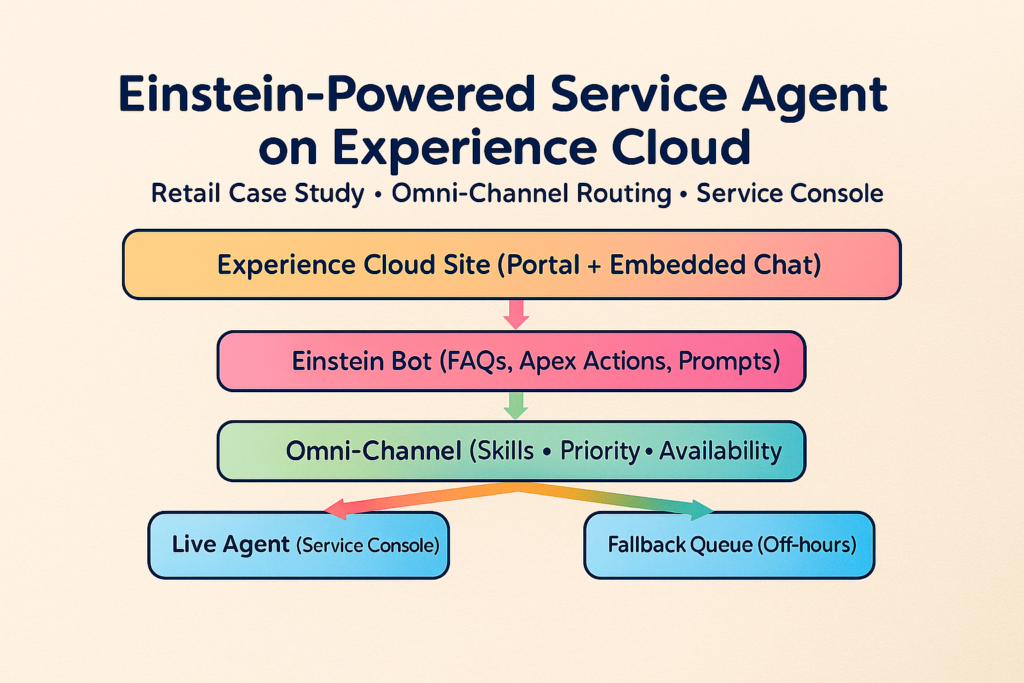This Salesforce Einstein Service Agent case study walks through how we rebuilt a retail brand’s support flow on Experience Cloud with Omni-Channel routing. The aim was simple: instant answers for routine questions and clean, context-rich handoffs to the right human—without increasing headcount.
“No one repeats themselves—conversation context travels from the AI to the live agent.”
Context: A mid-market retail brand faced a familiar pattern: high volumes of “Where’s my order?” requests, peak-time bottlenecks, and after-hours gaps. Agents were spending too much time re-collecting information customers had already shared. The mandate: improve responsiveness and experience, not costs.
Client context
The retailer operates with tight delivery windows and seasonal spikes that can double ticket volume within days. Most contacts were “Where’s my order?” or questions tied to cancellation windows that expire quickly. Agents were competent but overloaded, and customers often repeated details across touchpoints. Success for this project meant three things: shrink time-to-answer on routine requests, protect specialist time for policy-sensitive cases, and keep the brand voice consistent when agents weren’t available. We agreed early on to measure first-contact resolution, deflections versus escalations, and the time from bot greeting to a human reply when a handoff was necessary.
The challenge
We needed to give customers immediate, trustworthy answers for common tasks while ensuring fast, fair routing to specialists when human judgment mattered. That meant keeping conversation context intact, respecting business hours, and avoiding “VIP overload” on senior agents.
What we built
We implemented a branded Experience Cloud portal as the front door, an Einstein service agent (Agentforce) for first-contact automation, and Omni-Channel to route escalations into Service Console. Routine requests are answered instantly; sensitive or complex ones are handed to the right specialist with the full transcript and context. Together, this creates one flow: self-service when it’s safe, human expertise when it counts.
Experience Cloud (portal & chat): https://www.salesforce.com/products/experience-cloud/overview/
Agentforce (Einstein for Service): https://www.salesforce.com/agentforce/
Service AI overview: https://www.salesforce.com/service/ai/
Omni-Channel routing (overview): https://www.salesforce.com/service/digital-customer-engagement-platform/omnichannel-routing/
Omni-Channel routing (Help Center): https://help.salesforce.com/s/articleView?id=service.omnichannel_intro.htm&type=5
Service Console (agent workspace): https://www.salesforce.com/products/service-cloud/overview/
How it works
Customers start in chat for quick help. Simple questions—order status, return windows, store hours—are handled by the Einstein agent using lightweight Apex Actions to fetch data. When a request is sensitive (policy-bound cancellations, exceptions, complex returns), Omni-Channel evaluates skills, priority and availability, then hands off—with transcript and context—to the right live agent in Service Console. Outside business hours, a polite fallback queue acknowledges the request and schedules follow-up.
In this salesforce einstein service agent case study, we show how those handoffs stay fast and accurate without overloading specialists.
How routing was tuned
We started simple: intents map to queues, and queues map to skills. Then we layered three decision signals—confidence, policy sensitivity, and time window. If the model’s confidence dipped or the request touched an expiring window (cancellations/returns), the conversation was escalated. Omni-Channel then evaluated agent capacity and recent load so the same experts didn’t get hammered. We also added a polite pause before escalation to confirm intent, which cut accidental handoffs. After hours, a fallback queue acknowledged the request, captured any missing context, and triggered an email summary so agents began with a complete transcript rather than a cold start.
Architecture (snapshot)

Results from this Salesforce Einstein service agent case study
-
24/7 coverage for routine queries with brand-safe answers
-
Faster escalations to the right specialist using skills & priority
-
~30% fewer repetitive tickets, freeing agents for nuanced cases
Lessons & next
-
Signals for handoff: low confidence + policy sensitivity + time windows
-
Humane fallbacks: acknowledge clearly, set expectations, recap by email
-
What’s next: multilingual flows, additional channels (e.g., WhatsApp), and consolidated analytics for intents, FCR and queue health
Connect with us
If you’re exploring Salesforce service automation—from Einstein to Omni‑Channel—our team at Orbion can help you plan, implement, and optimize. Contact us to discuss your use case.


